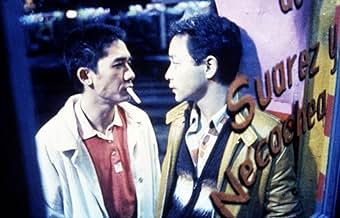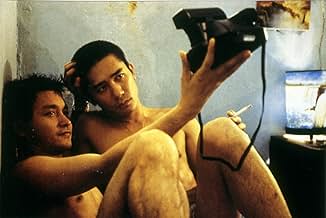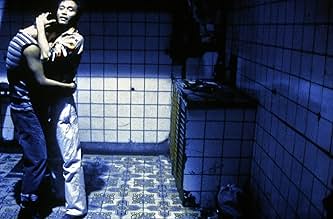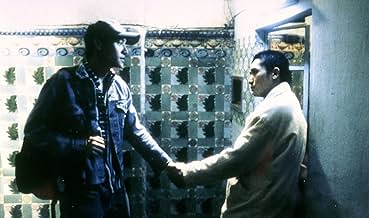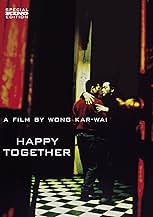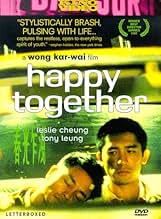A couple take a trip to Argentina but both men find their lives drifting apart in opposite directions.A couple take a trip to Argentina but both men find their lives drifting apart in opposite directions.A couple take a trip to Argentina but both men find their lives drifting apart in opposite directions.
- Awards
- 7 wins & 20 nominations total
Tony Leung Chiu-wai
- Lai Yiu-fai
- (as Tony Chiu Wai Leung)
Shirley Kwan
- Fai's Girlfriend
- (scenes deleted)
- Director
- Writers
- All cast & crew
- Production, box office & more at IMDbPro
Featured reviews
I didn't think so the first time I saw HAPPY TOGETHER, but I really think this film is a masterpiece. Technically it's amazing - the hand-held camera-work is incredible, and the mindbending shifts from saturated colors to monochrome (which I first felt was a stylish stunt) really underscores the loneliness and alienation of the characters brilliantly - the overall effect by the films' end is devastating.
HAPPY TOGETHER was apparently also - at least partially - inspired by the Argentine novelist Manuel Puig, author of 'Kiss Of The Spider Woman' among many other novels, and Puig's fiction tackles similar issues in a similarly fractured style (filled with footnotes, digressions and sudden shifts in perspective), all to incredibly powerful emotional effect.
If HAPPY TOGETHER is something of an homage to Puig, it's a great one. On it's own it's also a devastating portrait of a disintegrating relationship.
HAPPY TOGETHER was apparently also - at least partially - inspired by the Argentine novelist Manuel Puig, author of 'Kiss Of The Spider Woman' among many other novels, and Puig's fiction tackles similar issues in a similarly fractured style (filled with footnotes, digressions and sudden shifts in perspective), all to incredibly powerful emotional effect.
If HAPPY TOGETHER is something of an homage to Puig, it's a great one. On it's own it's also a devastating portrait of a disintegrating relationship.
Aw-kommon's notes on "Happy Together" are typical of those who cannot approach a film without aligning it with definite paradigms and secure standards. In this case, the paradigm is "Midnight Cowboy" -- a film that belongs to a totally different genre, was written and shot according to "naturalistic" procedures of Hollywood commercial cinema and, most of all, deals with romance from a quite different perspective. In "Midnight Cowboy" redemption of homoeroticism comes through death, a strategy that was quite revealing of the morals that prevailed at the time the movie was produced. "Happy Together", on the other hand, deals with romance as if it could have been homo-, hetero- or whatever, and even though homoeroticism is such an essential element to the narrative, the protagonists'love affair is a pretext for the emergence of their decentered identities, their search for love and friendship and, most important, it ends on a note of hope of future encounters. All that in a poetic tone, one that demands a continuous esthetic reconstruction, hardly understood (or accepted) by those who are encapsulated in a world of conventional filmmaking.
A poignant portrait of a relationship between two men uprooted from their home country, Happy Together explores the ups and downs, the pros and cons of commitment, as the lead characters careen and collide against each other with their discordant personalities acted out wonderfully.
"Happy Together " is essentially a study of a couple falling in and out of love. Their sex - they are a gay couple from Hong Kong - hardly matters: the film could just as well have been about a straight or lesbian couple. The fact that very near the beginning there is as explicit a scene of male anal intercourse as one is likely to encounter in mainstream commercial cinema is far from gratuitously sensational. As the film is meant to start on a passionate high, this is the most convincing way of doing it - so be it. The director has the integrity not to repeat this for the reason that the couple never quite feel the same about each other again - indeed there is a great deal of alienation. Both have arrived in Argentina in search of work. Although the jobs undertaken by one of the pair, Lai, are fairly menial, first as a doorman at a Tango club and then a kitchen worker, he seems more stable than his companion, Ho, who does little but hustle, gets beaten up fairly early on and spends much of his time in an incapacitated state. In the room they share there is a lampshade depicting the Izuazi Falls. The cascade almost becomes a symbol for the relationship they would ideally like to achieve. Early on they hire a car to look for it but lose their way. After their relationship has finally broken Lai finds it, but as he is alone, the landmark seems sadly lacking in excitement. There is a third main character, a straight guy from Taiwan, who works in the kitchen with Lai. With his amiable self-sufficiency he seems to have been introduced to provide a balance to the angst of the main pair, a device that works well as it reinforces our sympathy for them. "Happy Together" looks rough and crude. A hand held camera is used with frenetic nervousness. Sequences of monochrome alternate with scenes that are almost perversely over-coloured. I know it is fashionable to give some films a nightmarish look. Here I found it a distinct stumbling block to be got over for the sake of a work that says so much about loneliness, homesickness and the struggle of people simply to be "happy together".
"Happy Together" is a depressing film. Yet it's one which I keep coming back to when I feel down and heartbroken.
Lost souls, lonely, longing, and lovelorn, are staples in the Wong Kar-Wai universe. His best works uncannily portray the beauty and misery of being struck by love and its multiple variations and illusions. His fluid, script-free, improvisational style of work is now legendary and applies well to the unpredictable nature of this subject matter while giving his works a raw, open-ended quality. "Happy Together" is quite probably his rawest work to date and, as a result, one of the most difficult to watch (this honor goes to "Ashes of Time"). The rawness makes it seem organic. It feels as if it's an ever-evolving creature which hides and exposes its multiple facets with each different viewing.
Argentina sounds like a great romantic escape for most of us but for our couple, Po-wing (Leslie Cheung) and Yiu-fai (Tony Leung), it's a lonely, bleak, melancholic place on the edge of the world. Travelogue film this isn't. Buenos Aires may have initially held romantic promise for them. "Let's start over," Po-wing asks Yiu-fai yet again, and off they go to South America to work things out. Soon, however, the place becomes a physical representation of their relationship. It's claustrophobic and oppressive, something that could've been so beautiful yet one which they now need to escape from. Wong beautifully portrays spectacular Iguazu Falls with mythical significance throughout the film. Initially nothing more than amusing kitsch, it eventually progresses as the defining geographical manifestation of their amorous aspirations. It achieves such heavy, symbolic power, the last time we see it is one of the most memorable scenes in the film.
If the homosexual angle seems downplayed here, it is to parallel the film's treatment. It's so matter-of-fact it's irrelevant and even embarrassing to make an issue out of it. This is a couple who just happens to be gay. Indeed, there is nothing gay-specific about the film, the couple may well have been straight and it wouldn't make a difference at all.
"Happy Together" is such a vivid examination of a relationship, it's occasionally painful to watch. The emotional authenticity, however, makes it quite absorbing. Wong Kar-Wai often aims for the heart and, with the possible exception of "In the Mood for Love", he's never been closer to his target.
Lost souls, lonely, longing, and lovelorn, are staples in the Wong Kar-Wai universe. His best works uncannily portray the beauty and misery of being struck by love and its multiple variations and illusions. His fluid, script-free, improvisational style of work is now legendary and applies well to the unpredictable nature of this subject matter while giving his works a raw, open-ended quality. "Happy Together" is quite probably his rawest work to date and, as a result, one of the most difficult to watch (this honor goes to "Ashes of Time"). The rawness makes it seem organic. It feels as if it's an ever-evolving creature which hides and exposes its multiple facets with each different viewing.
Argentina sounds like a great romantic escape for most of us but for our couple, Po-wing (Leslie Cheung) and Yiu-fai (Tony Leung), it's a lonely, bleak, melancholic place on the edge of the world. Travelogue film this isn't. Buenos Aires may have initially held romantic promise for them. "Let's start over," Po-wing asks Yiu-fai yet again, and off they go to South America to work things out. Soon, however, the place becomes a physical representation of their relationship. It's claustrophobic and oppressive, something that could've been so beautiful yet one which they now need to escape from. Wong beautifully portrays spectacular Iguazu Falls with mythical significance throughout the film. Initially nothing more than amusing kitsch, it eventually progresses as the defining geographical manifestation of their amorous aspirations. It achieves such heavy, symbolic power, the last time we see it is one of the most memorable scenes in the film.
If the homosexual angle seems downplayed here, it is to parallel the film's treatment. It's so matter-of-fact it's irrelevant and even embarrassing to make an issue out of it. This is a couple who just happens to be gay. Indeed, there is nothing gay-specific about the film, the couple may well have been straight and it wouldn't make a difference at all.
"Happy Together" is such a vivid examination of a relationship, it's occasionally painful to watch. The emotional authenticity, however, makes it quite absorbing. Wong Kar-Wai often aims for the heart and, with the possible exception of "In the Mood for Love", he's never been closer to his target.
Did you know
- TriviaChang Chen's storyline was completely improvised. Director Wong Kar-Wai discovered the restaurant, China Central, by chance and, seizing Leslie Cheung's absence due to a concert tour, decided to keep shooting. Chang's plot was thus created.
- GoofsWhen Po-Wing knocks the packs of cigarettes off the clock, it says 2:38, but then it cuts to another angle of him doing this with the clock saying 3:33, and then it cuts again to the clock saying 2:38.
- Quotes
Lai Yiu-fai: Turns out that lonely people are all the same.
- Crazy creditsIn some prints, Jacques Picoux (the French subtitle translator) is listed twice in a row in the closing credits.
- Alternate versionsDuring a fire accident in 2019 while the 4K digital restoration was in progress, some of the original 35mm camera negative was lost. In the ensuing months the negative was attempted to be restored as much possible, but a portion of it had been permanently damaged. Lost was not only some of the picture but also the sound in those reels. As a result, Wong had to shorten some of Tony Leung's monologues, but with the work of the restoration crew of L'Immagine Ritrovata, they managed to restore most of the scenes to better quality.
- ConnectionsFeatured in The Movie Show: Episode dated 25 May 1997 (1997)
- SoundtracksCucurrucucu Paloma
by Caetano Veloso
- How long is Happy Together?Powered by Alexa
Details
- Release date
- Countries of origin
- Official site
- Languages
- Also known as
- Happy Together. Historia de un encuentro
- Filming locations
- Production companies
- See more company credits at IMDbPro
Box office
- Budget
- $4,200,000 (estimated)
- Gross US & Canada
- $320,319
- Gross worldwide
- $1,540,521
- Runtime
- 1h 36m(96 min)
- Color
- Sound mix
- Aspect ratio
- 1.85 : 1
Contribute to this page
Suggest an edit or add missing content


